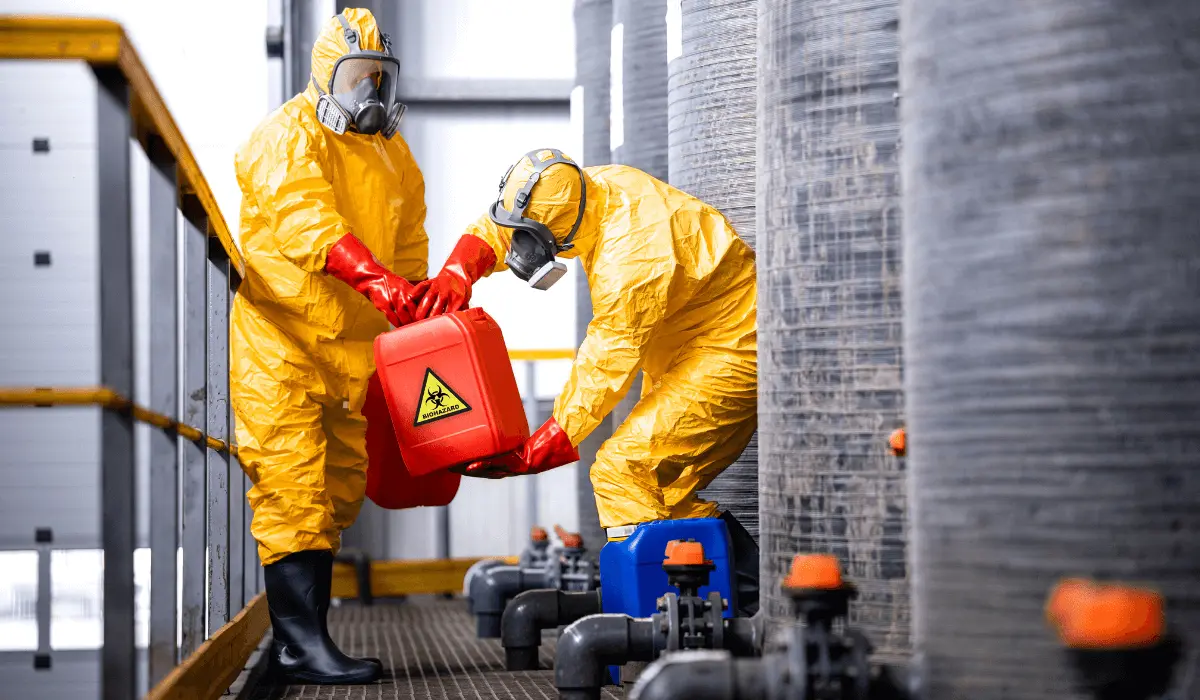Strategies for Improving HSE Awareness in Malaysian Chemical Processing Plants
Michelle . Follow
6 months ago

In the Malaysian chemical processing industry, ensuring a safe working environment and promoting Health, Safety, and Environment (HSE) awareness among workers are of utmost importance. The potential risks and hazards associated with handling chemicals require a proactive approach to prevent accidents and protect the well-being of employees.
To enhance safety practices and foster a culture of HSE awareness, many companies in Malaysia rely on the expertise of consultants specializing in occupational health and safety. These consultants play a crucial role in providing guidance, implementing strategies, and improving safety standards in chemical processing plants.
The main objective of consultants is to assist organizations in complying with occupational safety and health regulations and developing effective safety management systems. By leveraging their experience and expertise, consultants can identify potential risks, conduct thorough risk assessments, and propose suitable control measures to mitigate hazards in the workplace.
According to the Occupational Safety and Health Act, employers have a legal obligation to ensure the safety and well-being of their employees. By engaging consultants, companies can gain access to the knowledge and resources required to meet these legal requirements effectively.
Consultants can educate employees on best practices, help establish safety protocols, and conduct regular inspections to identify any safety gaps or non-compliance issues. Their involvement in the implementation and monitoring of safety measures significantly contributes to reducing workplace accidents and ensuring a safe working environment.
In the following sections, we will delve deeper into the strategies and best practices for improving HSE awareness and safety standards in the chemical processing industry, along with exploring the specific role that consultants play in enhancing HSE awareness among workers in Malaysian chemical processing plants.
HSE Strategies and Best Practices in Chemical Processing Plants
Safety is of utmost importance in the chemical processing industry. Implementing effective Health, Safety, and Environment (HSE) strategies and best practices is essential for creating a safe working environment for workers. These strategies not only contribute to the well-being of employees but also ensure compliance with occupational health and safety regulations.
Here are some proven strategies and best practices for improving HSE awareness and safety standards in chemical processing plants:
1. Comprehensive Safety Training: Provide comprehensive safety training programs that cover a wide range of topics, including hazard identification, risk assessment, and proper use of personal protective equipment (PPE).
2. Robust Risk Management: Develop a robust risk management system that includes regular risk assessments, hazard mitigation plans, and emergency response protocols. This helps identify and address potential risks before they result in accidents or incidents.
3. Clear Safety Regulations: Establish clear safety regulations and guidelines that are communicated effectively to all employees. These should cover areas such as storage and handling of hazardous materials, equipment maintenance, and safety protocols for specific tasks.
4. Regular Workplace Inspections: Conduct regular inspections to identify potential safety hazards and address them promptly. This includes assessing equipment integrity, identifying signs of wear and tear, and ensuring compliance with safety standards.
5. Promote Safety Culture: Foster a strong safety culture within the organization by encouraging active participation from all employees. This can be achieved through safety meetings, safety committees, and recognition programs for employees who demonstrate exemplary safety practices.
6. Continuous Improvement: Regularly review and update safety procedures, taking into consideration new technologies and industry best practices. Embrace a continuous improvement mindset that encourages innovation in safety practices.
The Role of Consultants in Enhancing HSE Awareness
Expert HSE consultant plays a vital role in promoting and enhancing Health, Safety, and Environmental (HSE) awareness among workers in Malaysian chemical processing plants. Their expertise and guidance contribute to improving safety practices and creating a culture of safety within the industry. Here are the key ways in which consultants contribute to HSE awareness:
1. Conducting thorough HSE assessments
Consultants conduct comprehensive assessments of the workplace to identify potential hazards and risks. By thoroughly evaluating the work environment, they help identify areas where safety measures can be improved and suggest practical solutions to mitigate risks. These assessments include evaluating equipment, processes, and work procedures to ensure compliance with safety regulations and industry best practices.
2. Developing tailored HSE programs
Based on the assessment findings, consultants develop customized HSE programs designed to address the specific needs of chemical processing plants. These programs include training modules, safety protocols, emergency response plans, and communication strategies tailored to the industry and the workforce. By providing clear guidelines and procedures, consultants enhance safety awareness among workers.
3. Delivering targeted HSE training
Consultants deliver specialized training sessions focused on HSE awareness and best practices. Through interactive workshops, seminars, and practical demonstrations, they educate workers on various safety aspects, such as hazard identification, risk assessment, proper use of personal protective equipment (PPE), and emergency preparedness. This targeted training ensures that workers are equipped with the necessary knowledge and skills to prioritize safety in their daily work activities.
4. Facilitating compliance with regulations
Consultants help organizations understand and comply with Occupational Safety and Health Act regulations in Malaysia. They guide companies in implementing safety protocols and requirements mandated by the authorities. By ensuring compliance, consultants help create a safe working environment and reduce the risk of workplace accidents and incidents.
5. Fostering a safety culture
Consultants play a pivotal role in fostering a culture of safety within chemical processing plants. They actively engage with employees, management, and stakeholders to promote safety awareness and encourage proactive safety participation. By fostering a positive safety culture, consultants help create an environment where safety is valued and prioritized by every individual in the organization.
Compliance with Occupational Safety and Health Act
The Occupational Safety and Health Act (OSHA) in Malaysia plays a crucial role in ensuring the safety and well-being of workers in all industries, including chemical processing plants. This act outlines the responsibilities and obligations of employers and employees in maintaining a safe working environment. By understanding and complying with the OSHA requirements, companies can significantly improve their health, safety, and environmental (HSE) performance.
Employer Responsibilities
Under the Occupational Safety and Health Act, employers have several key responsibilities to ensure workplace safety. These include:
1. Providing a Safe Working Environment: Employers are required to provide a workspace that is free from hazards and potential risks. This involves conducting regular risk assessments, identifying potential hazards, and implementing appropriate control measures.
2. Safety Training: Employers must provide comprehensive safety training to their employees, ensuring they are equipped with the necessary knowledge and skills to carry out their tasks safely. This includes training on hazard identification, proper use of personal protective equipment (PPE), emergency response procedures, and more.
3. Safety Regulations and Guidelines: Employers must adhere to the safety regulations and guidelines set forth by the regulatory authorities. This includes maintaining proper machine guarding, ensuring proper storage and handling of hazardous materials, and implementing safety protocols for specific processes or equipment.
4. Workplace Inspections: Employers are required to conduct regular workplace inspections to identify potential hazards or unsafe conditions. These inspections should be documented, and any identified issues should be promptly addressed to mitigate risks.
Employee Obligations
Employees also have important obligations under the Occupational Safety and Health Act to contribute to a safe working environment. These include:
1. Following Safety Procedures: Employees must comply with all safety procedures and guidelines established by the employer. This includes wearing appropriate PPE, reporting unsafe conditions, and cooperating with safety training initiatives.
2. Participating in Safety Programs: Employees should actively participate in workplace safety programs and initiatives, providing feedback and suggestions for improvement. By engaging in safety discussions and reporting near-miss incidents, employees contribute to the overall safety culture of the organization.
3. Reporting Incidents and Accidents: Employees must promptly report any workplace incidents or accidents to their supervisors. This allows for timely investigation and appropriate corrective actions to prevent similar incidents in the future.
Benefits of Consulting Services
Consulting services play a crucial role in enhancing HSE awareness and improving safety practices in the chemical processing industry. By partnering with experienced consultants, companies can benefit in several ways:
1. Expertise and Guidance: Consultants bring a wealth of knowledge and expertise in HSE regulations and best practices. They help companies navigate complex safety requirements and provide guidance on implementing effective safety protocols tailored to their specific needs.
2. Risk Assessment and Mitigation: Consultants conduct thorough risk assessments to identify potential hazards and develop strategies to mitigate them. Their proactive approach minimizes the likelihood of workplace accidents and injuries, ensuring a safer working environment.
3. Compliance with Regulations: Staying compliant with the Occupational Safety and Health Act in Malaysia is crucial. Consultants help companies understand and fulfill their obligations under the law, avoiding penalties and legal issues.
4. Training and Education: Consultants provide comprehensive training programs to enhance employees' understanding of HSE principles and best practices. They ensure that workers are equipped with the necessary knowledge and skills to identify hazards, follow safety protocols, and respond effectively in emergency situations.
5. Continuous Improvement: Consultants help foster a culture of continuous improvement by regularly assessing and monitoring safety performance. They identify areas for improvement, implement corrective measures, and ensure sustainable safety practices.
Conclusion
Enhancing HSE awareness among workers in Malaysian chemical processing plants is crucial for ensuring a safe working environment. Consultants play a vital role in promoting safety practices and improving safety standards in the industry. By implementing proven strategies and best practices, such as hazard identification, risk management, and safety training, employers can create a culture of safety in the workplace.
Compliance with the Occupational Safety and Health Act is essential, as it outlines the responsibilities and obligations of both employers and employees. This legislation provides a framework for maintaining workplace safety standards and preventing workplace accidents.
By prioritizing HSE awareness and investing in consulting services, companies can ensure the safety and well-being of their workers. A safe working environment not only protects employees but also contributes to the overall success and sustainability of the chemical processing industry in Malaysia.
Recommended topics
Recommended from Guest Post

Michiel Ton
Halloween Festival Photography during Magic Break Festival Creepville in Antalya – by Michiel Ton
October 23, 2024Harvey Spectre
+1+844+524+2867 How to Change Name on Spirit Airlines Ticket: A Comprehensive Guide
September 11, 2024Suman Khan


